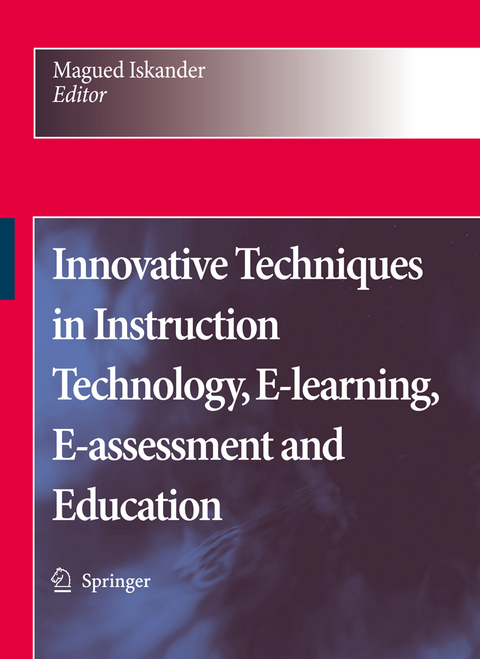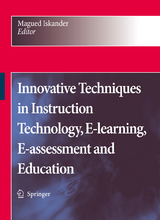Innovative Techniques in Instruction Technology, E-learning, E-assessment and Education
Springer-Verlag New York Inc.
978-1-4020-8738-7 (ISBN)
1. Development Of Online Internet Laboratory (Online I-Lab)/ A.Salihbegovic, S.Ribic. 2. E-Assessment Tool/ A.M.Rashad et al. 3. Developing Educational Applications using Adaptive e-Learning Model/ A.Balla, A.Sarirete. 4. Web Laboratory Experiences for Elearning/ R. RESTREPO et al. 5. Development and Implementation of an Information Server for Web-based Education in Astronomy/ A. Alegre et al. 6. Using Graphing Calculators for Teaching Advanced Calculus Courses/ A.Y. Vaninsky. 7. Systemic Design Of Instruction On Achieving The Goals Of Undergraduate Level Education In Universities/ A.Kirigha, N.-Abooki. 8. A Systems Model for Authentic Pedagogy Conceptualizing a Scaleable, University-wide Production Curriculum/ A.T. Brown III. 9. Evaluating the Usability of the Mobile Interface of an Educational Website/ F. J.Diaz et al. 10. Enhancing High School Science Through Sensor-Based Lab Exercises/ A.Popichak. 11. Blackboard Adoption and Adaptation Approaches/A.Narwani & M.Arif. 12. An Empirical Study of Product Metrics in Software Testing / Y.Singh et al. 13. A Dual-Mode Collaborative Teaching and Learning Classroom Environment/ C. N. Thai. 14. Can Multicore Processing Learn from Arithmetic Concepts?/ C.Mueller. 15. Come Play/ C.Caulfield, S. P. Maj. 16. A Tool to support Self-Education in a Lifelong Learning/ D.Baziukaite et al. 17. Postgraduate distance e-learning programme on IT in Construction/ D.Rebolj. 18. A Hybrid Lab for Evaluation of Analog ASICs / M.E. Auer, D.Garbi Zutin. 19. Blogging from the Top/ D.C. Wyld. 20. NP-Hard Graph Problems’ Algorithms Testing Guidelines/ D.Kumlander. 21. Pattern-Based Usability Evaluation of E-Learning Systems/ D.Zub, E.Eessaar. 22. Computerized Education/ G.G. Kuleshov. 23. E-Education Over Homogenous Network/ E.Küren, A.Cellatoglu.24. From Software Engineering to Enterprise Engineering/ E.Ortner. 25. On Translation-Based Design of UML Profiles/ E.Eessaar. 26. Was Dyslexia used to order the Alphabet?/ E.Hibbs. 27.Construction of Assessments with Double Adaptation Processes/ H.G. Barbosa León et al. 28. A Study on How Software Engineering Supports Projects Management/ M.-I.Sanchez-Segura et al. 29. Multi-variant assignment generation and assessment techniques/ G.I. Ankoudinov et al. 30. Critique of Traditional Statistical Tests in Asset Pricing Models/ H.Lin. 31. Impact of Short Sale Constraints on Pricing of Restricted Stocks/ H.Lin, Z.Zheng. 32. Blogfolios for Student-Centered Reflection and Communication/ H.Hao Yang. 33. Innovative Online Course using an Integrated Virtual Reality Based E-Learning Tool with Course Management Tool/ H.El-Mounayri et al. 34. Understanding Math Concepts through Computer-Modeled Virtual Objects/ J. Trujillo et al. 35. Knowledge Control Model of Distance Learning System on IMS Standard/ H. Kravtsov, D. Kravtsov. 36. Issues and Difficulties in teaching Novice computer programming/ I.T. Chan Mow. 37. Activity Theory for Designing Ubiquitous Learning Scenarios/ J.An. 38. An Inexpensive Approach for a Scalable, Multi-Boot Computer Lab/ J.D. Feher and K.Bhandari. 39. Lessons from the e-Learning Experience in South Korea in Traditional Universities/ D.Lee et al. 40. Some Innovations for Keeping an e-Learning System Alive/ J. López-Cuadrado et al. 41. Applying a Methodology for Educating Students with Special Needs/ J. L. Fuertes et al. 42. Evaluation Framework of Hypertext Access for Program Comprehension Support/ J.Koskinen. 43. A Model for Multiplayer Interactive Games in Cellular Wireless Environment/ V.P. Chandu, K.Singh. 44. An Evolutionary Algorithm for QueryOptimization in Database/ K.Asghari et al. 45. Cooperative Training Initiative/ K.S. Rabayah, B.Sartawi. 46. Contribution to the Research and Education of Innovation Engineering and New Product Development at the University/ K.Zgodavova et al. 47. Our Stations for Teaching Programmable Devices/ K. M. Noga, M. Radwanski. 48. Implementation of learning objects using J2ME/ L.Ramos de
| Zusatzinfo | XVII, 601 p. |
|---|---|
| Verlagsort | New York, NY |
| Sprache | englisch |
| Maße | 178 x 254 mm |
| Themenwelt | Schulbuch / Wörterbuch ► Unterrichtsvorbereitung ► Unterrichts-Handreichungen |
| Mathematik / Informatik ► Informatik ► Software Entwicklung | |
| Informatik ► Weitere Themen ► Hardware | |
| Sozialwissenschaften ► Pädagogik | |
| Technik ► Elektrotechnik / Energietechnik | |
| ISBN-10 | 1-4020-8738-1 / 1402087381 |
| ISBN-13 | 978-1-4020-8738-7 / 9781402087387 |
| Zustand | Neuware |
| Haben Sie eine Frage zum Produkt? |
aus dem Bereich




